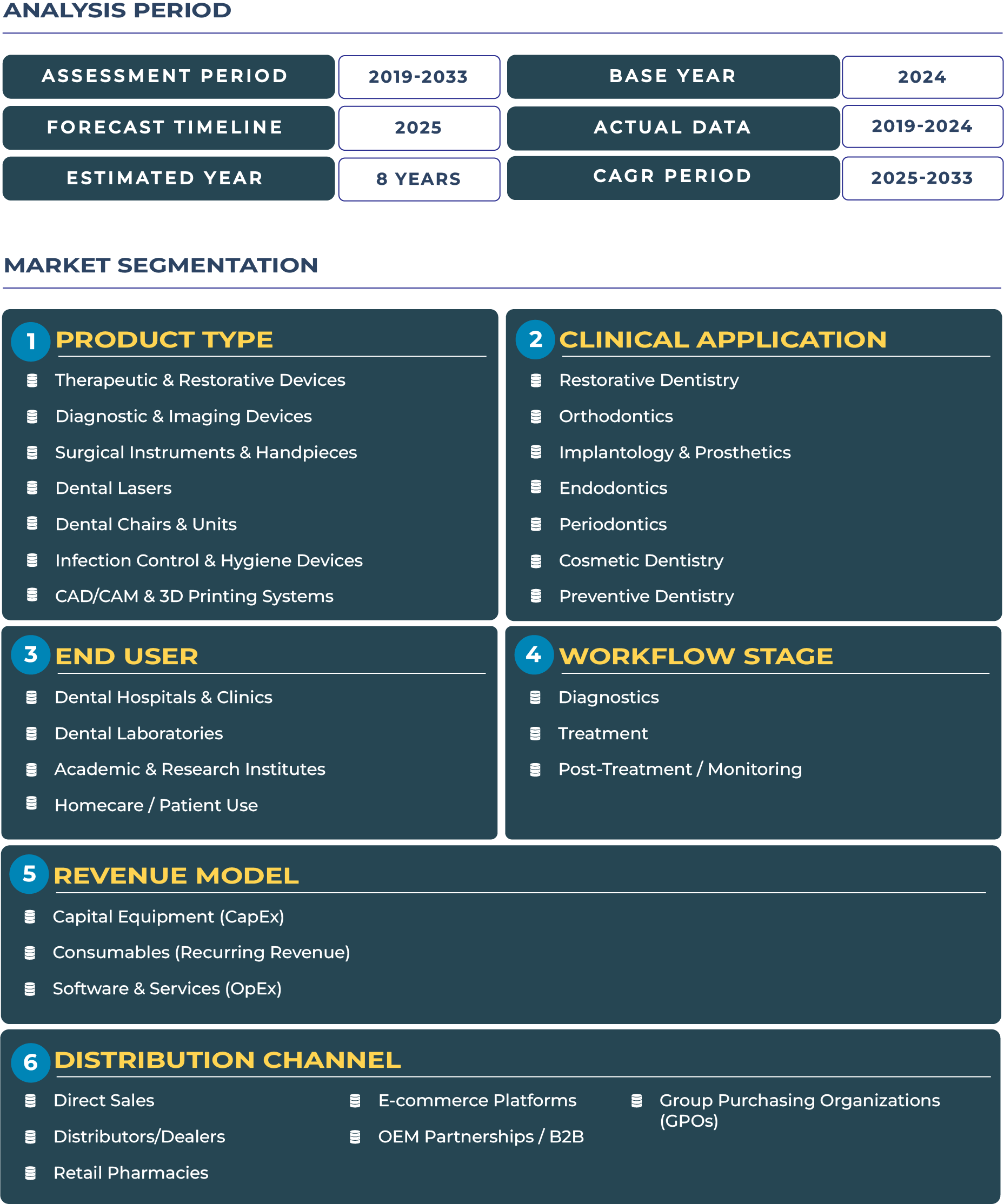Kuwait Dental Devices Market Outlook: High Per-Capita Spending and Dependence on Imports Driving Growth
The Kuwait dental devices market reflects the country’s unique healthcare dynamics, where a small yet affluent population sustains robust demand for advanced dental care. Kuwait’s reliance on imported devices has shaped a premium-focused dental devices industry, with international manufacturers dominating supply. With high per-capita healthcare spending and significant reliance on expatriate communities seeking advanced dental care, the dental devices sector in Kuwait is positioned for consistent expansion. Valued at USD 163.4 million in 2025, the market is expected to reach USD 305.9 million by 2033, recording a CAGR of 8.1%. Growth is anchored in specialist clinics, rising demand for cosmetic and restorative treatments, and a healthcare system that prioritizes premium medical solutions. This makes Kuwait a lucrative niche within the wider GCC dental devices landscape.
Healthcare Affluence and Specialized Clinics Accelerating Kuwait Dental Devices Ecosystem
Several drivers underpin the rapid development of the dental devices market in Kuwait. The country boasts one of the world’s highest per-capita healthcare expenditures, allowing hospitals and specialist dental centers to procure cutting-edge therapeutic devices, dental imaging systems, and CAD/CAM technologies. The relatively small population provides agility in healthcare upgrades, with private specialist clinics in Kuwait City emerging as central hubs for advanced restorative and implant dentistry. Demand for orthodontic solutions, dental lasers, and infection control devices continues to expand, supported by a growing focus on preventative oral health. Additionally, expat-driven demand for global-standard care strengthens Kuwait’s role as a premium hub for dentistry within the Middle East.
Market Restraints: Small Scale and Import Dependency Limiting Expansion of Kuwait Dental Devices Sector
Despite robust spending patterns, Kuwait dental devices ecosystem faces structural restraints. Market scale remains small compared to other GCC neighbors, limiting economies of scale for distributors and service providers. Heavy reliance on imported devices increases exposure to foreign exchange risks and logistics challenges, particularly in periods of geopolitical tension or disrupted global supply chains. Price sensitivity in non-premium dental care segments also restricts adoption of advanced technologies outside affluent urban clinics. Furthermore, the absence of large-scale local manufacturing restricts innovation within Kuwait, creating ongoing dependence on external suppliers for high-value categories such as prosthetic devices and dental handpieces.
Premium Procedures and Stable Private Sector Growth Emerging as Key Kuwait Dental Devices Market Trends
The dental devices industry in Kuwait is characterized by a growing preference for premium dental procedures, especially in urban centers like Kuwait City. Clinics are investing in advanced dental chairs and surgical instruments to enhance patient experiences and support high-margin cosmetic and implant treatments. The market also benefits from consistently high average selling prices (ASPs) for dental equipment, reflecting Kuwait’s premium-driven ecosystem. Stable growth in the private healthcare sector is enabling clinics to modernize with digital dentistry platforms, CAD/CAM systems, and 3D printing solutions for prosthetic applications. These trends reinforce Kuwait’s position as a high-value but niche dental devices landscape in the Middle East.
Opportunities in Concierge Dentistry and Service-Centered Partnerships within Kuwait Dental Devices Ecosystem
Unique opportunities exist for global manufacturers and regional distributors to differentiate themselves in the Kuwait dental devices sector. Targeting high-end clinics in Kuwait City with long-term service and warranty contracts offers consistent revenue streams. Concierge dentistry models, tailored for affluent local and expatriate populations, represent an untapped partnership avenue. Additionally, international players can expand their footprint by offering professional training programs and digital workflow integration to specialist clinics. With Kuwait’s healthcare strategy emphasizing modernization and patient comfort, opportunities lie in aligning dental devices industry offerings with premium services, robust after-sales support, and localized engagement strategies.
Competitive Landscape: Partnerships and Premium-Centric Strategies Defining Kuwait Dental Devices Market
The competitive dynamics of the Kuwait dental devices market are shaped by the dominance of international players and their partnerships with local distributors. Companies such as Dentsply Sirona are active in providing advanced imaging and CAD/CAM systems, which remain popular among Kuwait’s specialist clinics. Between 2022 and 2025, Kuwait’s healthcare sector witnessed notable modernization programs, with announcements of new private dental centers and upgrades in existing hospital dental units reported in national media. Key strategies revolve around targeting high-end clinics with service-driven contracts and forming partnerships for concierge dentistry offerings. These approaches enable manufacturers to capture premium demand while mitigating challenges arising from Kuwait’s small but high-value dental devices sector.







